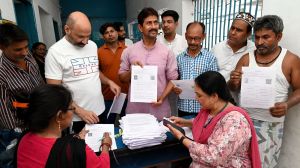Popping the pension pill
On the slow-burner for almost seven years now, the future course of pension reforms now hinge on in-the-works talks between the Finance Mini...

On the slow-burner for almost seven years now, the future course of pension reforms now hinge on in-the-works talks between the Finance Minister and the Left on the Pension Fund Regulatory Development Authority (PFRDA) Bill. ‘‘In a sense, this is the final hurdle for Indian pension reforms,’’ says a PFRDA official.
How soon will this hurdle be crossed so that this long-awaited and socio-economically vital reform is kicked off? Remember, time is of the essence. As Interim PFRDA chairman Dhirendra Swarup recently said, ‘‘We will be able to make the New Pension Scheme (NPS) operational from October 2006, if the PFRDA Bill is passed by December-end.’’
As things stand, it’s clear that a full agreement with the Left Parties on the PFRDA Bill has still not been reached. At the recent co-ordination meet, the FM had given the Left a note on the Bill, which they have to get back on. Ministry officials say that the Bill will be put up to Cabinet only after an agreement is reached. ‘‘Once the Left is on board, the Cabinet and subsequently, Parliament’s approval will only be a procedural matter that can be done in 2-3 days,’’ the officials say.
And what about the Left? If you cut out the rhetoric — ‘‘We are opposed to it tooth and nail,’’ said CPI’s Gurudas Dasgupta — it appears the hard line on pension is becoming increasingly tenuous and isolated, even among the Left Parties. Nilotpal Basu of the CPI (M), for instance, has said that the government’s proposal would be studied and alternative proposals would be given. His tone is softer than Dasgupta’s: ‘‘It is not that we have to accept the government’s proposals. It is for the government to accept our proposals.’’
The Left’s main problem with the New Pension Scheme — it exposes government employees’ retirement funds to the vagaries of the stock market — has already been addressed.
One of the investment options in the NPS will now offer members the choice 100 per cent of their pension savings into government securities. A finance ministry official says: ‘‘This would mean that there will be a 100 per cent guarantee on the principal amount invested by workers. Moreover, if they hold the securities till maturity, even the interest component will be assured.’’
Another demand — returns from the pension funds be guaranteed — is also being considered. Swarup has stated that though the PFRDA would not offer such a guarantee, such a promise can be offered by pension fund managers if subscribers opt to pay for it.
Why it matters
Needless to say, the generous pension promises made to government workers in the past are unsustainable and inequitable for society at large. Employees joining the government on or after January 1, 2004, have been shifted to the NPS, where the government’s promise ends at contributing their share of pension each month. About 15 state governments have also signed up.
As of now, the NPS may only be applicable for about two lakh government employees, but one must not forget that it will eventually be open for the huge unorganised sector workforce in the country that currently does not have access to any social security instruments. From a vegetable vendor to a self-employed PCO operator, anyone could join the scheme.
The NPS, once operational, will also be the first serious competition for the jurassic monolith, the Employees’ Provident Fund Organisation (EPFO), that has been mismanaging workers’ funds for years, without any accountability. The entire workforce’s old-age burden now rests on the shoulders of the comrades.



- 01
- 02
- 03
- 04
- 05




























